Chapter 48: Mauretania Ascendant (1664-1666)
Chapter 48: Mauretania Ascendant (1664-1666)
With the Imperium dominating the lands to the east, the ambitions of the Empress and the Senate started to turn towards the West. With the East secured under Exarch control, the former lands of the Western Empire had grown prosperous and powerful, and its strength was not to be ignored. France and Spain, once known as Gaul and Hispania in the times of the ancient empire, had created powerful kingdoms of their own before their fall from grace. As Elysian control started to be expanded into Southern Italy, one important region from the West was largely kept out of the attention of the Empire. North Africa
The former Roman provinces of Mauretania and Africa became largely independent when the Vandals arrived in North Africa in 429, breaking Roman control over their southern coastline. Christianity had also spread rapidly in the region in the centuries forth and fifth centuries before being violently extinguished by the Islamic conquests. From what was the heartland of Carthage, the region was divided across Arab Kingdoms and Berber realms.
With the intention to reconquer the west, the Elysians concentrated their armies to break the backs of the Islamic kingdoms and tribes that dominated the landscape of North Africa. The Exarchate of Mauritania largely served an original purpose from securing Elysian control across the Pillar of Hercules, largely as a buffer state, and served with zeal in fighting against the enemies of the Empire.

It was now that the time that, under the will of the Empire, that Mauritania was to ascend from the small exarch that had served as a buffer to the large sultantates of the south and become something greater. It was through the will of the Empress and the Senate that North Africa was to be transformed into an Elysian kingdom. In time, the Muslim lords of the region would be brought to bend the knee, but the Elysian intentions for the Moors were to break their back by stripping them of their most valuable asset. The sea.
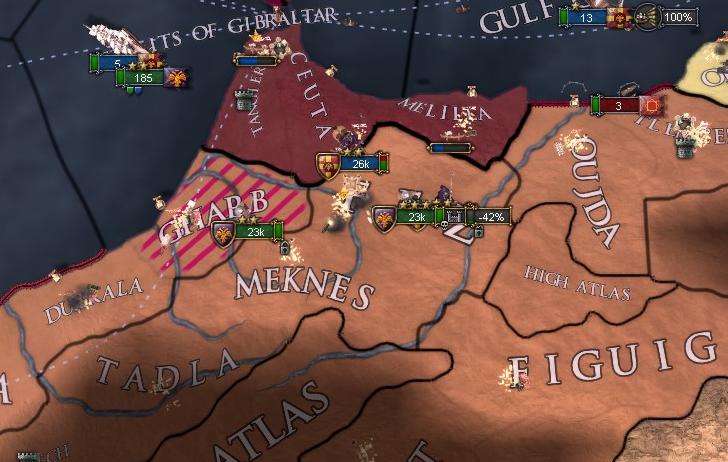
With the declaration of war against Morocco during the spring of 1664, fifty thousand of the Empire’s finest would cross the Pillars of Hercules and start to break into northern Morocco. The Imperial Thema would soon be reinforced by Hispanian involvement into the war, and the climate had favored the Elysians during the early stages of the war. The Moorish army was nowhere to be seen, and within days, the Sultanate’s coastline would be blockaded entire by the seemingly endless fleets of the Empire and the exarch.

In the new two months, with the Sultanate’s army still not being seen for quite some time, the Elysians carefully sieged down the urbanised cities of Fez and Gharb, focusing on being costly with attrition. Fighting along the mountainous steppe, southern deserts and valleys of the Atlas mountains was considered a great issue of concern to the Elysian commanders, who would cautiously siege and focus onto maintaining their soldiers without the loss of attrition. The Exarchs were much more reckless, sending tens of thousands of men at a time to siege the lands past the High Atlas. Many future wars would see an overwhelming loss due to attrition by the Elysian exarchs, while the Empire planned accordingly whenever possible.

With no hostile armies in sight, the Siege of Fez would continue uninterrupted for the remainder of the year. Fez would surrender after many months of siege and would open all of Northern Morocco to Imperial advancements.

Taking advantage of the fragile sultanates of the Maghreb, Tunis had no remaining friends and had their strength sapped from a disastrous war against its neighbours. Elysian commanders would immediately pressure the military council in the region to launch an invasion of Tunis from the east, something that would be unanimously agreed upon by the council. The objective of the Elysians was to seize the coastline along Tripolitania, but if possible, another goal was to seize Tunis itself.
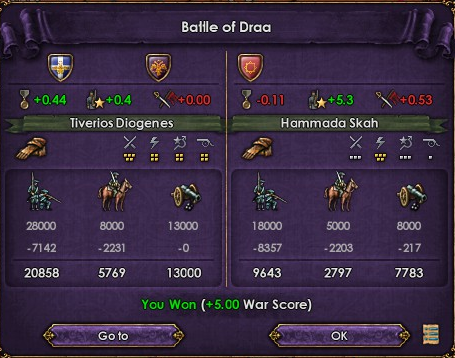
After over a year of warfare, it would be Constantina that would engage against the Moroccan army, relocating past the Atlas mountains after the fall of Fez. While the Moroccans had the territorial advantage against the Hellenics, the Elysian armies would arrive to reinforce Constantina from its position after several days of fighting. The Moroccan commander, not wanting to risk destruction, would retreat from the south and head towards the coast, where in time the Moorish army would be trapped and destroyed by the large Hispanian army.

On the other side of the globe, the Otomo were leading the Japanese into experiencing a spiritual awakening of sorts. While economically self-sufficient, the Japanese church was becoming a powerful social institution along the archipelago. While many of the populace still adhered to the folk-religion of the region, many of the elite in this new Japanese society were Christians. The establishment of a Japanese church would accelerate missionary efforts in the region, something which horrified the Shogunate and Kyoto. Nagasaki, originally a small fishing village in a secluded harbour, would grow under a diverse port-city in the coming decades. Many Elysians would call Nagasaki as “The Rome of Japan”, where the centre of the Japanese church would be located. While some difficulties persisted in the evangelistic developments of Japan, especially among the north, growing tensions among the Shogunate and the Otomo ‘traitors’ would continue to threaten a fragile peace in the area.
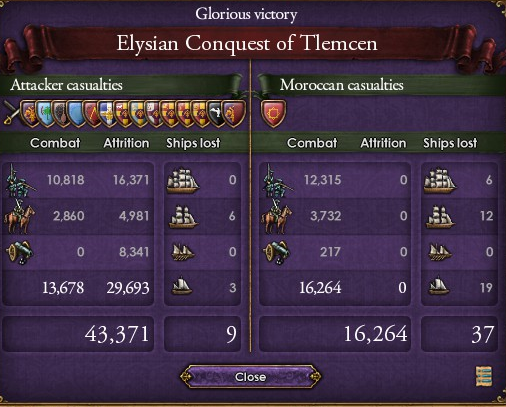
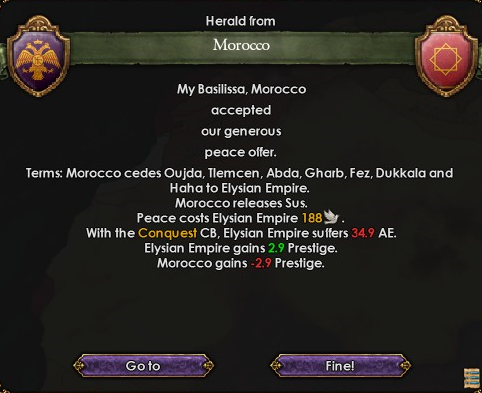
Despite their efforts in safeguarding the southern territories, Morocco would be forced to lose the entire coastline to the Elysians and a separatist state that was forced to be granted its freedom. With the loss of the coastline, Morocco would be forced into the arid plains and the Altas Mountains, and suffer economically from losing two of its major cities.
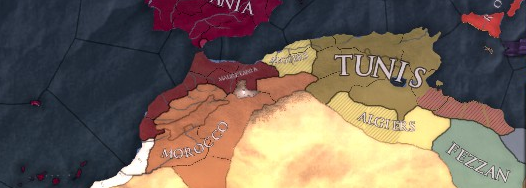
The inflicted blow placed upon Morocco would come at the cost of tens of thousands of zealous lives, but the fallen soldiers did not die in vain, as the Sultanate would be neutered economically and would lack the manpower to retake its territories. With the defeat of the Moors in the West, Tunis would face the combined arms of the East.
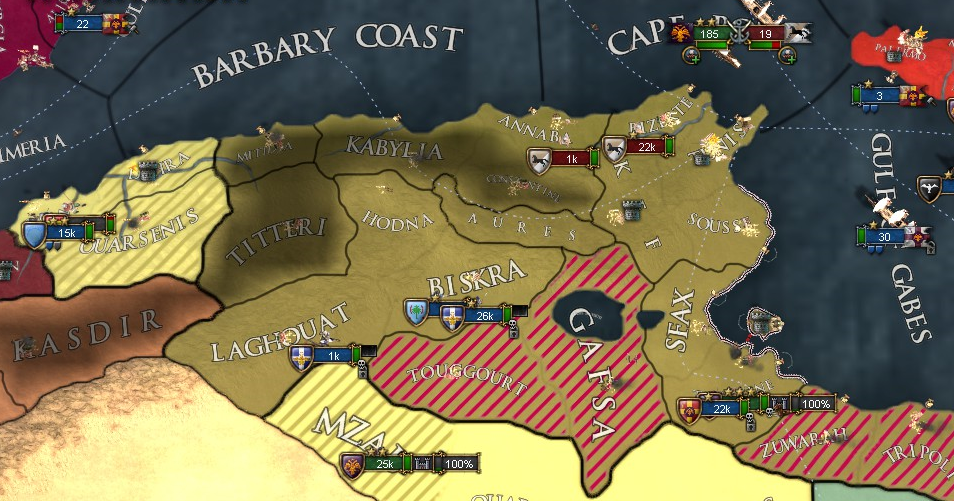
Liberating the lands of the interior to prevent them from falling into Tunisian hands, the interior was focused to be liberated by the armies of the Empire. Slowly but methodically, the Elysians took their time by sieging the lands of the Sultanate but preventing recapture of them by the enemy. The Empire would give no quarter or surrender, be it on land or sea.

Over many years of construction, the Elysians would once again change the course of ships and of history through its ingenuity and genius. Connecting one sea with another, there had been multiple attempts across history to connect the Red Sea and the Mediterranean in some capacity, but it would not be until the Elysians would accomplish this feat. In a similar vein to the Panama Canal, the Empire would accomplish the impossible at the cost of human lives. Sailors would no longer need to sail around an entire continent to reach Europe or Asia. Once a barrier of land that was once considered impossible, the ingenious engineers of the Empire worked through hundreds of kilometers of desert to create a canal to merge two worlds with one another.
Much like the Panama project, many workers and slaves would die during the construction of what would come to be known as the Suez Canal. Working under the hot Egyptian sun and learning from the mistakes from Panama, the Empire had taken much more precautions in the building of the canal. Worker camps were stocked with necessities such as food and water, and the terrain of the planned Canal was significantly easier to build than the tropical nightmare that was known as Panama. While the overwhelming majority of the workers would largely be made up of workers from all sorts of backgrounds, a minority group were consisted of slaves and prisoners of war.
Excellent worker conditions, excellent leadership among project overseers and with settlements built to facilitate care for the workers, the Suez Canal was significantly safer to construct than Panama was. Some workers would die from heatstroke and a loss of lives still occurred due to unfortunate circumstances, but the grand project would be significantly safer than its predecessor project. On September 25th 1665, the Suez Canal would be opened to the world in an elaborate ceremony, where Empress Anastasia would use the ceremony to impress the rulers of Europe and the Near East, hoping to display the majesty of Imperial might and prestige. With a small ceremonial fleet of Elysian ships being to first to cross the canal, the Suez Canal would officially be opened to the wider world.
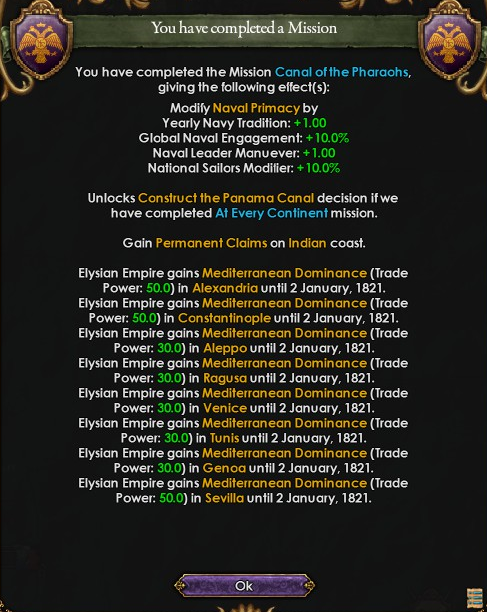
The economy of the Mediterranean would change overnight, and a new era of Elysian dominance would come to overshadow the market. The Suez Canal was the talk of all the merchants in Europe, and the coastal cities of nearby Aegyptus would thrive. Elysian dominance of the Mediterranean, both politically and economically, allowed the markets of Alexandria and Constantinople to thrive to new heights with the construction of the canal. Other regions of trade would come to see a significant increase of Elysian influence in the region, and Hispania would temporarily experience an economic boom within the Iberian markets.
The Elysians were now the masters of both the two exits of the Mediterranean. From the Pillars of Hercules to the Suez Canal, the Elysians held a monopoly on a majority of Mediterranean trade, particularly among the East. While still interested in fulfilling its ambitions along Western Europe, the Empire was achieving new heights one decade at a time.
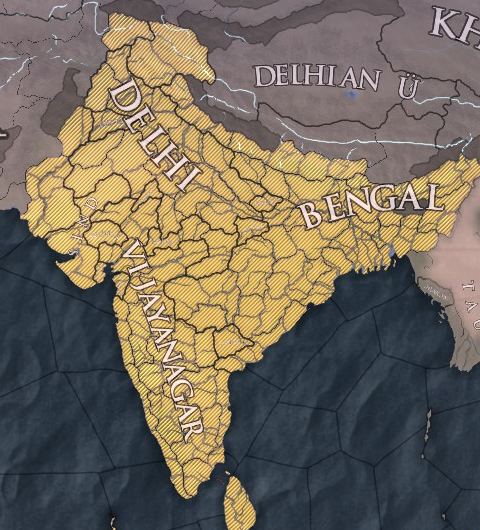
The dominance of the Elysian Empire was growing to untold heights, and the Empire seemed it was only appropriate to look into the wealthy lands of India. India had long been divided almost by three by the major powers of the region, but remained politically and religiously divided for many centuries. With an interest in Asia, the Empress believed in the potential that could be utilised under a united India. Should the Empire claim dominion over India, Elysian Imperial rule would never falter. But the Empress expressed concern about overextending Imperial rule, which would lead it to collapse from unforeseen consequences. The Empress believed that the Empire should only attain a limited role in India, if possible, to safeguard the Indian Ocean.
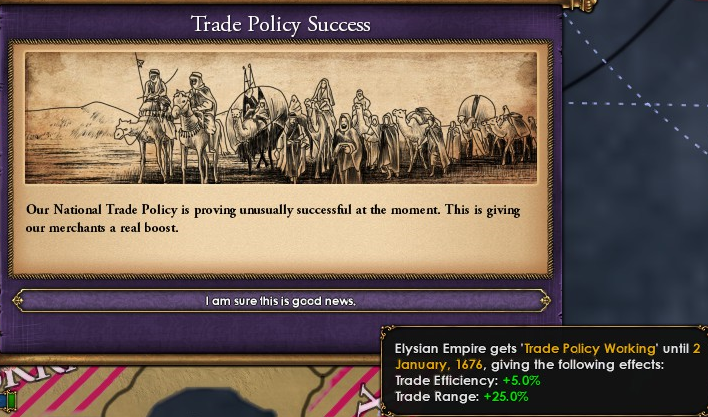
National trade policies, along with the excellent timing of the opening of the Suez Canal, would prove unusually successful. While expected to succeed with the opening of the canal, Elysian merchants would receive a considerable boost across all the markets of the Empire. The Elysian economy, especially among the Exarchs, would start to thrive. Some even began to wonder if the beginnings of an economic golden age was upon them.

At the Battle of Annaba, the Tunisian army would be defeated by an overwhelmingly large Elysian force commanded by the King of Hispania. Alfons V de Borja would come shatter the Tunisian army, and while not attaining total victory, brought Tunis to its knees. Desperate, Mas’ud Badra would flee with his armies to the west, abandoning the core region and leaving it vulnerable.
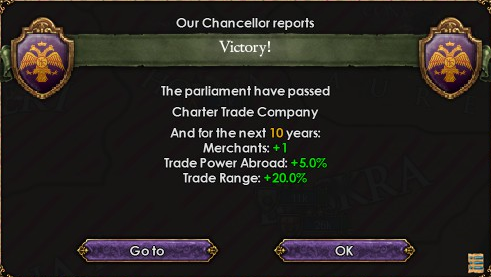
Riding the success of the opening of the Suez Canal, the Senate would officially support Charter Trade Companies operating across the Mediterranean as a means to promote investment into the Empire and its exarchs as a whole. Wanting to invest into Aegyptus, the Empire would come to promote trade in the exarch and encourage investment to the exarch, much to the delight of the Coptic elite.
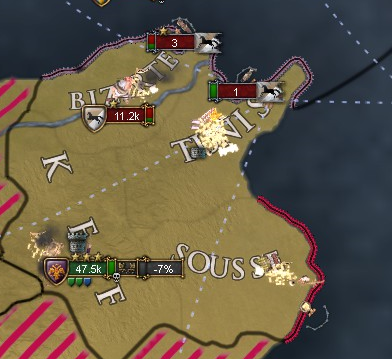
With almost the entirety of the Sultanate brought under the Empire, the broken remains of the Sultanate’s army and the blockade of the capital itself had left Tunis into an incredibly dire position. The last remaining fortress left under heavy bombardment and being completely surrounded, a message was to be sent to Tunis with a list of demands to the Sultan in exchange for peace. The Elysian general, Tiverios Diogenes, would make the demands for Tunis well-known and spoke to the Sultan about going along the terms willingly. Should the Sultan refuse, the general promised to ‘raze Carthage a second time’
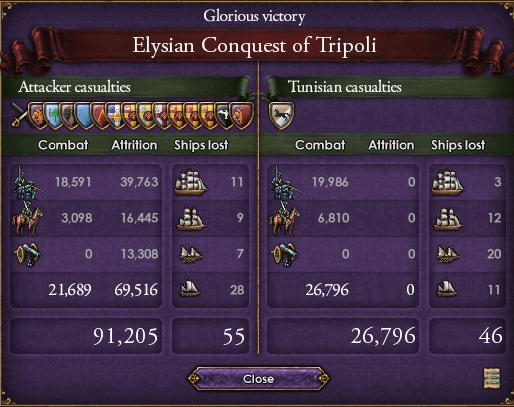
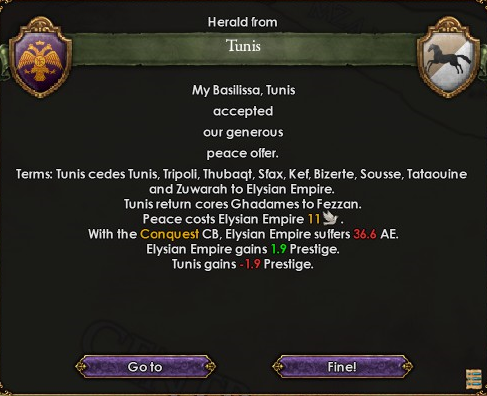
Backed into a corner and with no possible way to fight back, the Sultan agreed to see reason and ended the war in exchange for peace. Realizing that continuing the war against the Elysians was a suicidal move, the Sultan would accept the terms only to protect the capital and his own family. The peace terms were devastating, with a vast majority of the coastline being seized to push the Sultanate into the Sahara and the interior. While not able to seize everything, the Empire would conquer a vast portion of the Maghreb and incorporate the new territory to Mauretania.
With the region dealt with for the time being, the Elysians continued to build infrastructure along the Eastern Exarchates with the aid of the newly blossoming economy. As the Elysians would continue focusing on developing and expanding their exarch kingdoms, the Elysians had been watching the Persians for quite some time. The Empire knew their capabilities, from their strengths and weaknesses and were growing accustomed to the 'Eastern Threat'. With the Persians never being quite the same after the Caucasus War, there was a new opportunity for expansion to the East.
It was time to reclaim Mesopotamia.
With the Imperium dominating the lands to the east, the ambitions of the Empress and the Senate started to turn towards the West. With the East secured under Exarch control, the former lands of the Western Empire had grown prosperous and powerful, and its strength was not to be ignored. France and Spain, once known as Gaul and Hispania in the times of the ancient empire, had created powerful kingdoms of their own before their fall from grace. As Elysian control started to be expanded into Southern Italy, one important region from the West was largely kept out of the attention of the Empire. North Africa
The former Roman provinces of Mauretania and Africa became largely independent when the Vandals arrived in North Africa in 429, breaking Roman control over their southern coastline. Christianity had also spread rapidly in the region in the centuries forth and fifth centuries before being violently extinguished by the Islamic conquests. From what was the heartland of Carthage, the region was divided across Arab Kingdoms and Berber realms.
With the intention to reconquer the west, the Elysians concentrated their armies to break the backs of the Islamic kingdoms and tribes that dominated the landscape of North Africa. The Exarchate of Mauritania largely served an original purpose from securing Elysian control across the Pillar of Hercules, largely as a buffer state, and served with zeal in fighting against the enemies of the Empire.
It was now that the time that, under the will of the Empire, that Mauritania was to ascend from the small exarch that had served as a buffer to the large sultantates of the south and become something greater. It was through the will of the Empress and the Senate that North Africa was to be transformed into an Elysian kingdom. In time, the Muslim lords of the region would be brought to bend the knee, but the Elysian intentions for the Moors were to break their back by stripping them of their most valuable asset. The sea.
With the declaration of war against Morocco during the spring of 1664, fifty thousand of the Empire’s finest would cross the Pillars of Hercules and start to break into northern Morocco. The Imperial Thema would soon be reinforced by Hispanian involvement into the war, and the climate had favored the Elysians during the early stages of the war. The Moorish army was nowhere to be seen, and within days, the Sultanate’s coastline would be blockaded entire by the seemingly endless fleets of the Empire and the exarch.
In the new two months, with the Sultanate’s army still not being seen for quite some time, the Elysians carefully sieged down the urbanised cities of Fez and Gharb, focusing on being costly with attrition. Fighting along the mountainous steppe, southern deserts and valleys of the Atlas mountains was considered a great issue of concern to the Elysian commanders, who would cautiously siege and focus onto maintaining their soldiers without the loss of attrition. The Exarchs were much more reckless, sending tens of thousands of men at a time to siege the lands past the High Atlas. Many future wars would see an overwhelming loss due to attrition by the Elysian exarchs, while the Empire planned accordingly whenever possible.
With no hostile armies in sight, the Siege of Fez would continue uninterrupted for the remainder of the year. Fez would surrender after many months of siege and would open all of Northern Morocco to Imperial advancements.
Taking advantage of the fragile sultanates of the Maghreb, Tunis had no remaining friends and had their strength sapped from a disastrous war against its neighbours. Elysian commanders would immediately pressure the military council in the region to launch an invasion of Tunis from the east, something that would be unanimously agreed upon by the council. The objective of the Elysians was to seize the coastline along Tripolitania, but if possible, another goal was to seize Tunis itself.
After over a year of warfare, it would be Constantina that would engage against the Moroccan army, relocating past the Atlas mountains after the fall of Fez. While the Moroccans had the territorial advantage against the Hellenics, the Elysian armies would arrive to reinforce Constantina from its position after several days of fighting. The Moroccan commander, not wanting to risk destruction, would retreat from the south and head towards the coast, where in time the Moorish army would be trapped and destroyed by the large Hispanian army.
On the other side of the globe, the Otomo were leading the Japanese into experiencing a spiritual awakening of sorts. While economically self-sufficient, the Japanese church was becoming a powerful social institution along the archipelago. While many of the populace still adhered to the folk-religion of the region, many of the elite in this new Japanese society were Christians. The establishment of a Japanese church would accelerate missionary efforts in the region, something which horrified the Shogunate and Kyoto. Nagasaki, originally a small fishing village in a secluded harbour, would grow under a diverse port-city in the coming decades. Many Elysians would call Nagasaki as “The Rome of Japan”, where the centre of the Japanese church would be located. While some difficulties persisted in the evangelistic developments of Japan, especially among the north, growing tensions among the Shogunate and the Otomo ‘traitors’ would continue to threaten a fragile peace in the area.
Despite their efforts in safeguarding the southern territories, Morocco would be forced to lose the entire coastline to the Elysians and a separatist state that was forced to be granted its freedom. With the loss of the coastline, Morocco would be forced into the arid plains and the Altas Mountains, and suffer economically from losing two of its major cities.
The inflicted blow placed upon Morocco would come at the cost of tens of thousands of zealous lives, but the fallen soldiers did not die in vain, as the Sultanate would be neutered economically and would lack the manpower to retake its territories. With the defeat of the Moors in the West, Tunis would face the combined arms of the East.
Liberating the lands of the interior to prevent them from falling into Tunisian hands, the interior was focused to be liberated by the armies of the Empire. Slowly but methodically, the Elysians took their time by sieging the lands of the Sultanate but preventing recapture of them by the enemy. The Empire would give no quarter or surrender, be it on land or sea.
Over many years of construction, the Elysians would once again change the course of ships and of history through its ingenuity and genius. Connecting one sea with another, there had been multiple attempts across history to connect the Red Sea and the Mediterranean in some capacity, but it would not be until the Elysians would accomplish this feat. In a similar vein to the Panama Canal, the Empire would accomplish the impossible at the cost of human lives. Sailors would no longer need to sail around an entire continent to reach Europe or Asia. Once a barrier of land that was once considered impossible, the ingenious engineers of the Empire worked through hundreds of kilometers of desert to create a canal to merge two worlds with one another.
Much like the Panama project, many workers and slaves would die during the construction of what would come to be known as the Suez Canal. Working under the hot Egyptian sun and learning from the mistakes from Panama, the Empire had taken much more precautions in the building of the canal. Worker camps were stocked with necessities such as food and water, and the terrain of the planned Canal was significantly easier to build than the tropical nightmare that was known as Panama. While the overwhelming majority of the workers would largely be made up of workers from all sorts of backgrounds, a minority group were consisted of slaves and prisoners of war.
Excellent worker conditions, excellent leadership among project overseers and with settlements built to facilitate care for the workers, the Suez Canal was significantly safer to construct than Panama was. Some workers would die from heatstroke and a loss of lives still occurred due to unfortunate circumstances, but the grand project would be significantly safer than its predecessor project. On September 25th 1665, the Suez Canal would be opened to the world in an elaborate ceremony, where Empress Anastasia would use the ceremony to impress the rulers of Europe and the Near East, hoping to display the majesty of Imperial might and prestige. With a small ceremonial fleet of Elysian ships being to first to cross the canal, the Suez Canal would officially be opened to the wider world.
The economy of the Mediterranean would change overnight, and a new era of Elysian dominance would come to overshadow the market. The Suez Canal was the talk of all the merchants in Europe, and the coastal cities of nearby Aegyptus would thrive. Elysian dominance of the Mediterranean, both politically and economically, allowed the markets of Alexandria and Constantinople to thrive to new heights with the construction of the canal. Other regions of trade would come to see a significant increase of Elysian influence in the region, and Hispania would temporarily experience an economic boom within the Iberian markets.
The Elysians were now the masters of both the two exits of the Mediterranean. From the Pillars of Hercules to the Suez Canal, the Elysians held a monopoly on a majority of Mediterranean trade, particularly among the East. While still interested in fulfilling its ambitions along Western Europe, the Empire was achieving new heights one decade at a time.
The dominance of the Elysian Empire was growing to untold heights, and the Empire seemed it was only appropriate to look into the wealthy lands of India. India had long been divided almost by three by the major powers of the region, but remained politically and religiously divided for many centuries. With an interest in Asia, the Empress believed in the potential that could be utilised under a united India. Should the Empire claim dominion over India, Elysian Imperial rule would never falter. But the Empress expressed concern about overextending Imperial rule, which would lead it to collapse from unforeseen consequences. The Empress believed that the Empire should only attain a limited role in India, if possible, to safeguard the Indian Ocean.
National trade policies, along with the excellent timing of the opening of the Suez Canal, would prove unusually successful. While expected to succeed with the opening of the canal, Elysian merchants would receive a considerable boost across all the markets of the Empire. The Elysian economy, especially among the Exarchs, would start to thrive. Some even began to wonder if the beginnings of an economic golden age was upon them.
At the Battle of Annaba, the Tunisian army would be defeated by an overwhelmingly large Elysian force commanded by the King of Hispania. Alfons V de Borja would come shatter the Tunisian army, and while not attaining total victory, brought Tunis to its knees. Desperate, Mas’ud Badra would flee with his armies to the west, abandoning the core region and leaving it vulnerable.
Riding the success of the opening of the Suez Canal, the Senate would officially support Charter Trade Companies operating across the Mediterranean as a means to promote investment into the Empire and its exarchs as a whole. Wanting to invest into Aegyptus, the Empire would come to promote trade in the exarch and encourage investment to the exarch, much to the delight of the Coptic elite.
With almost the entirety of the Sultanate brought under the Empire, the broken remains of the Sultanate’s army and the blockade of the capital itself had left Tunis into an incredibly dire position. The last remaining fortress left under heavy bombardment and being completely surrounded, a message was to be sent to Tunis with a list of demands to the Sultan in exchange for peace. The Elysian general, Tiverios Diogenes, would make the demands for Tunis well-known and spoke to the Sultan about going along the terms willingly. Should the Sultan refuse, the general promised to ‘raze Carthage a second time’
Backed into a corner and with no possible way to fight back, the Sultan agreed to see reason and ended the war in exchange for peace. Realizing that continuing the war against the Elysians was a suicidal move, the Sultan would accept the terms only to protect the capital and his own family. The peace terms were devastating, with a vast majority of the coastline being seized to push the Sultanate into the Sahara and the interior. While not able to seize everything, the Empire would conquer a vast portion of the Maghreb and incorporate the new territory to Mauretania.
With the region dealt with for the time being, the Elysians continued to build infrastructure along the Eastern Exarchates with the aid of the newly blossoming economy. As the Elysians would continue focusing on developing and expanding their exarch kingdoms, the Elysians had been watching the Persians for quite some time. The Empire knew their capabilities, from their strengths and weaknesses and were growing accustomed to the 'Eastern Threat'. With the Persians never being quite the same after the Caucasus War, there was a new opportunity for expansion to the East.
It was time to reclaim Mesopotamia.

